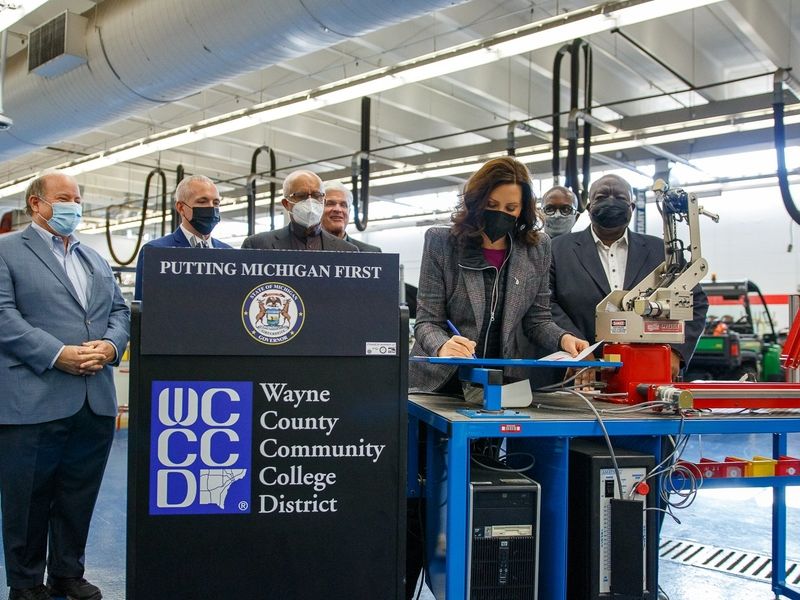
Michigan Gov. Gretchen Whitmer, alongside Senate Majority Leader Mike Shirkey and other political dignitaries in Detroit, on Monday signed a package of bills to create a pair of funds totaling $1.5 billion for business development and aid in Michigan.
Among the bills approved was a $1 billion economic development fund aimed at attracting large-scale development in Michigan that was inspired by the state missing out on Ford Motor Co.’s massive EV investment in Kentucky and Tennessee.
The fund will attract “tens of thousands of jobs” and make Michigan competitive for the next generation of manufacturing, Whitmer said.
“We know the next 20 months will determine what the next 20 years look like,” the Democrat governor said during the media event, held at Wayne County Community College’s Eastern Campus. “We have an unprecedented, once-in-a-generation opportunity. … We should continue this spirit of collaboration into the coming year.”
The bipartisan Strategic Outreach and Attraction Reserve package will “support small businesses and fully fund a historic economic development toolkit” for business development, according to a news release from the state.
The fund is part of the $1.88 billion appropriated last week toward grants, tax breaks and aid for businesses large and small. Much of that spending will come from the $5.7 billion in discretionary federal stimulus funds lawmakers still have at their disposal.
Officials said Monday there are dozens of projects in the pipeline but did not elaborate on which ones will be receive financial support through the funds. One likely candidate is the battery plant in Lansing planned by General Motors.
Whitmer confirmed that state officials have signed non-disclosure agreements related to projects and investments that will potentially be supported by the fund dollars. She said that NDAs in this context are “standard” and that “transparency is built in” because incentive approvals must still go through the Michigan Strategic Fund and open meetings.
“When you look at the industry and you look at the potential investments companies are making, this is kind of the standard in business, as I understand it,” Whitmer said in response to a question from a reporter. “We know that for us to compete, we need to understand what these potential clients or investors or businesses need to be successful…so that we can develop the vision and a plan that makes Michigan competitive.”
The package signed Monday also establishes a $500 million fund to support small businesses, help the economy keep pace with changes in technology and retain good-paying jobs, the release said.
Shirkey, a Republican, struck a bipartisan chord during the bill signing. Shirkey said the business development fund creates a “menu of options” enabling the state to be proactive about going after investment.
“Together, we welcome a new economic strategy. … We are affirming that we are at the table,” Shirkey said during the event.
Included in the bills was the creation of a financing mechanism for both programs and legislation to provide full funding, the release said.
“Thanks to the effective collaboration between legislative leadership, my administration, and community and business leaders, I signed bills that will back small businesses and empower Michigan to grow and attract billions in investment and create tens of thousands of good-paying jobs,” Whitmer said in the release.

